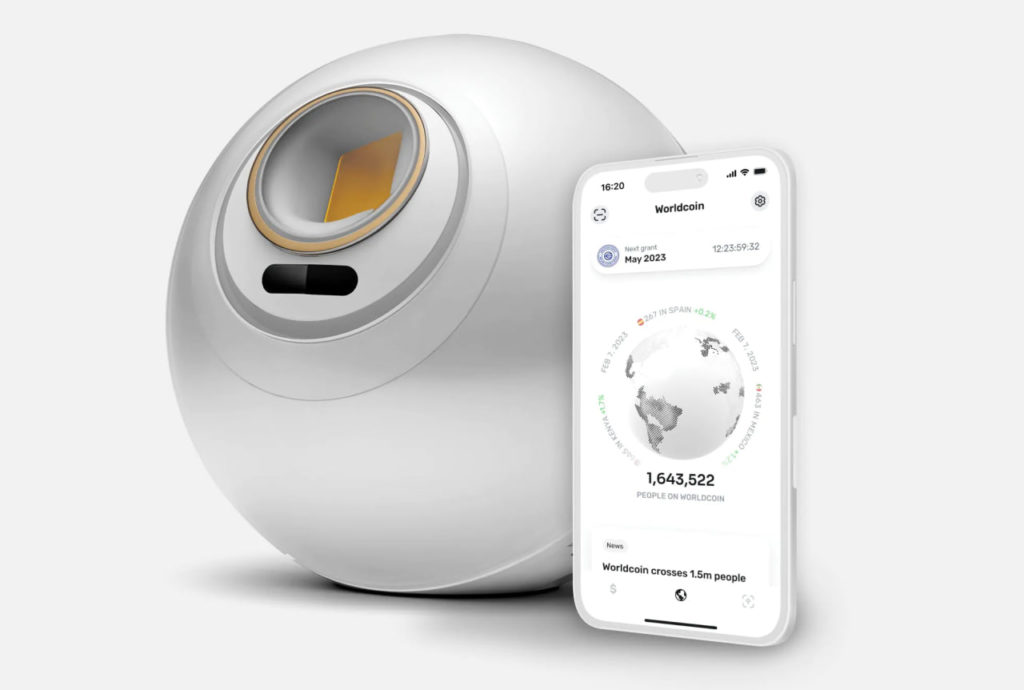On July 24, 2023, Worldcoin, a project supported by OpenAI CEO Sam Altman, was launched. Worldcoin introduces “The Orb”, a small device that scans irises to create an exclusive digital ID for users. This digital ID, known as World ID, offers holders “proof of personhood,” a novel approach in an era where artificial intelligence (AI) is increasingly prevalent, making it challenging to distinguish between AI-generated and human identities.
“In the age of AI, the need for proof of personhood is no longer a topic of serious debate; instead, the critical question is whether or not the proof of personhood solutions we have can be privacy-first, decentralized, and maximally inclusive.”
Alex Blania, CEO of Tools for Humanity

As stated on their website, more than two million people, with the vast majority located in the Global South, have been identified and are eligible to receive their token WLD. The initial token supply is 10 billion, with 20% allocated to the team and foundation and the remaining 80% allocated to users, operators, and the ecosystem. During Monday’s launch, 143 million Worldcoin tokens were made available. Out of this amount, 100 million WLD were transferred to market makers, while the rest were allocated to users who had been verified by an orb.
Nevertheless, the project has sparked controversy within the community due to allegations of using deceptive marketing practices, collecting more personal data than it acknowledged, and failing to obtain meaningful informed consent in nations such as Indonesia, Ghana, and Chile. Additionally, Worldcoin has faced criticism due to several operators responsible for registering individuals who sold the iris data on the black market. Despite the controversies, Worldcoin plans to accelerate registrations by deploying orbs in 35 cities across 20 nations worldwide. In March, the project entered into a deal with the production company Jabil to expand the number of devices. Worldcoin has revealed that the number of circulating orbs will increase from 200 to 1,500 by the end of the year.

Continuing further, several hours after the launch, Vitalik Buterin, the co-founder of Ethereum, published a new blog expressing his deep concern about Worldcoin and Proof-of-Personhood. His post outlines four significant issues: privacy, accessibility, centralization, and security.
According to Buterin, the project’s involvement in iris scanning raises privacy concerns. Even though Worldcoin only stores the hash of the iris scanning data, not the actual iris picture, and utilizes zk-Snark and other cryptographic techniques to safeguard user identities, there remains an inherent risk of identity-related information being misused or leaked. “At the very least, if someone else scans your iris, they can check it against the database to determine whether or not you have a World ID. Potentially, iris scans might reveal more information,” he added.
Buterin also expresses concerns about accessibility, as users need physical access to the Worldcoin Orb to participate, which limits the project’s reach. Unless enough Orbs are created for easy access by everyone, there could be an imbalance in the distribution of Worldcoin.
The third risk raised by Buterin is centralization. He notes that the integrity of Worldcoin’s Orb hardware cannot be verified, raising the possibility of backdoors. Even if the software layer is decentralized, the Worldcoin Foundation could still potentially insert a backdoor and create fake human identities. Buterin also highlights concerns about Worldcoin’s exclusive algorithms and governance, although he mentions that they have committed to decentralization and open-sourcing over time.
Lastly, Buterin points out security as another risk with the Worldcoin system. He mentions potential risks such as phone hacking, coercion for iris scanning by others, selling or renting IDs, and the use of 3D-printed “dummy” eyes to deceive the World ID scanning process. However, he acknowledges that these issues are not unique to Worldcoin’s solution.
Buterin acknowledges that there is no perfect solution to overcoming these issues. “There is no ideal form of proof of personhood,” Buterin writes. “Instead, we have at least three different paradigms of approaches that all have their own unique strengths and weaknesses.” Those three approaches are known as social-graph-based, general-hardware biometric, and specialized-hardware-biometric solutions (like Worldcoin).
In conclusion, the launch of Worldcoin and its Proof-of-Personhood approach has garnered attention and controversy in the community. While the project introduces an innovative concept with the use of iris scanning to create a digital ID, it has raised significant concerns about privacy, accessibility, centralization, and security. Despite the controversies, Worldcoin is determined to expand its reach and accelerate registrations by deploying more orbs worldwide. However, it is essential to address the raised concerns to ensure the project’s success and long-term viability.





